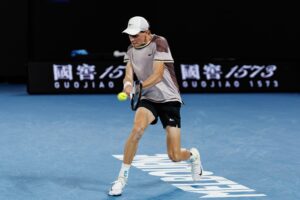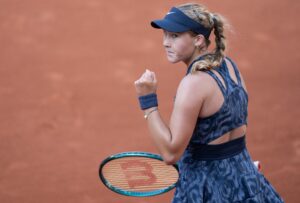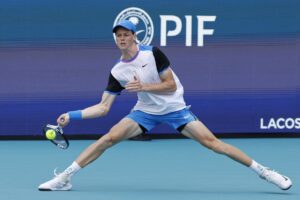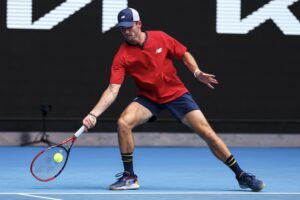Frustration will be a theme for more than a few players on the ATP Tour as the 2018 season draws to an end. One such player is world #6 Marin Cilic. On the surface, he has had a reasonable season. He has not yet qualified for the ATP Finals in London, but he has a sizable advantage over the chasing pack. If he does seal his berth, it will be the fourth time he has made it to the season ending showpiece. But Cilic is a player who should be aspiring to more, and with good reason.
Cilic might fairly claim to have been the world’s third best player from the conclusion of the US Open in 2016 until Wimbledon in 2018. He played some superb tennis in that time, taking advantage of the upheaval created by the collapse of the powerhouse that had been Novak Djokovic and the resurgence of Roger Federer and Rafael Nadal. He wasn’t able to win a second Grand Slam, but he did much to dispute the claims that he was a “One Slam Wonder.”
His strongest arguments were his appearances in finals at Wimbledon in 2017 and the Australian Open in 2018. He lost both to Roger Federer, the former because of injury, the latter narrowly after a five-set battle, though the decider did get away from him rather swiftly. But going into Wimbledon this year, there seemed to be a real chance for Cilic to strike again and claim more Grand Slam glory.
Federer’s form was uncertain, Nadal had not been past the fourth round at the All-England club since 2011, and Djokovic’s comeback had not yet hit full stride. Andy Murray, twice a champion at the All-England Club, was not even in the draw. Cilic had also won the title at Queen’s Club for the second time in his career, beating Djokovic in the final from match point down. He had earned his place amongst the contenders. And then he threw it all away.
In the second round, he was well on his way to dismissing Guido Pella on Court 1. The Argentine has never been known for his grass court prowess and Cilic took the first two sets with ease. He looked comfortable in the third, only for the skies to darken and the gloom of a rain delay to set in. When play resumed, Cilic fell apart. He bled unforced errors at an alarming rate and the match began to slip away from him, with Pella ultimately completing a famous 3-6 1-6 6-4 7-6 7-5 upset.
By Cilic’s own admission, it was one of the worst losses of his career. And unfortunately for Cilic, that was just the start of a summer filled with disappointing defeats. In Toronto, despite winning the first set of his quarterfinal with Rafael Nadal thanks to some blistering tennis, Cilic wavered and ended up on the wrong end of a 6-2 4-6 4-6 scoreline. In Cincinnati in the semifinals, despite playing the better tennis for much of the match, Cilic lost 4-6 6-3 3-6 to Novak Djokovic.
At the US Open, Cilic played well to reach the quarterfinals before narrowly losing in five sets to Kei Nishikori in another match where he started exceptionally well before his level dropped. Those were not terrible results, he lost to opponents of the highest calibre after respectable runs at big tournaments. But they must have been bitter defeats all the same, because they were all narrow losses and two came from winning positions for Cilic.
His Asian swing will have done little to improve his mood either. In Tokyo at the Japan Open, where he was the top seed, he again won the first set but not the match, losing 6-3 4-6 6-7 to Jan-Lennard Struff. In Shanghai, he had a match point in the second set and led by a break in the decider but still contrived to lose 6-2 6-7 5-7 to Chile’s Nicholas Jarry. As a result, Cilic’s season looks to be in danger of rather fizzling out.
Which is unsurprising as it is hard to look upon 2018 as anything other than a missed opportunity for Cilic to cement his legacy. He did manage to push Federer hard in Melbourne and it is hard to imagine that he or any other could have stopped Nadal winning in Paris or Djokovic in New York. Wimbledon was his great missed chance and he will know that. Because in the tennis world there is a great gulf between those who have won a Major and those who have won two or more.
Cilic may well end up in the Hall of Fame regardless. Andy Roddick, who won the 2003 US Open but was never able to add to it, was inducted last year. Cilic’s resume does not lag too far behind Roddick’s. And it is superior to David Ferrer’s, who was spoken about as a future inductee by former world #4 Todd Martin. With the great three having dominated the sport so entirely for so long, the requirements for entry to the Hall of Fame may well be lowered for this era.
Which does not seem unfair. In another era, David Ferrer may well have won Slams. Cilic would probably have won more. The achievements of the players of today pale beside those of bygone eras, but those players did not have opponents capable of producing the sustained brilliance of Federer, Nadal and Djokovic. Thus Cilic and his contemporaries have had both the honour and the disadvantage of competing against surely the greatest trio of all time, perhaps in any individual sport let alone tennis.
That should be a comfort for Cilic when he looks back on his career. He walked beside giants and, once, he conquered them. But how much more satisfying would it have been if he had done it twice?
Main Photo:
Embed from Getty Images






